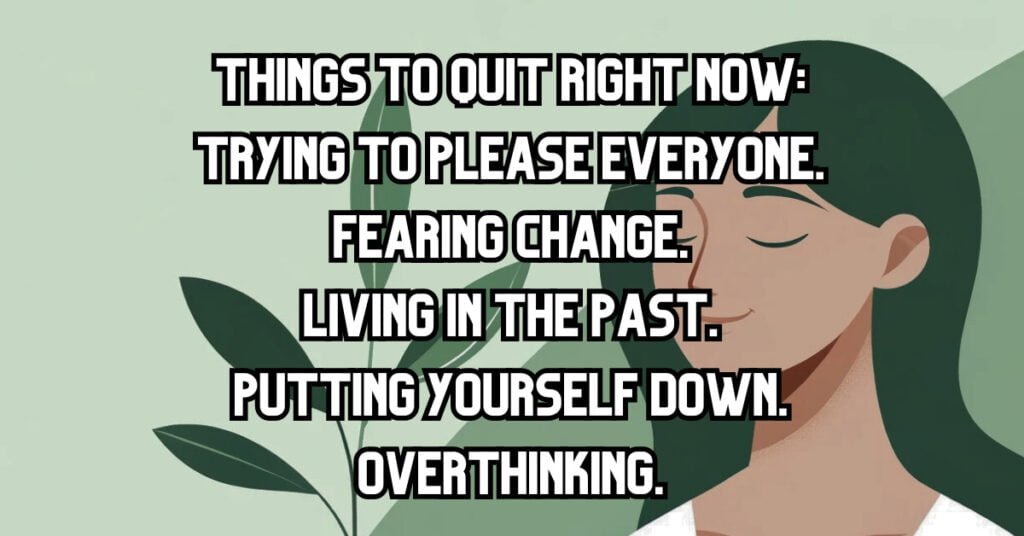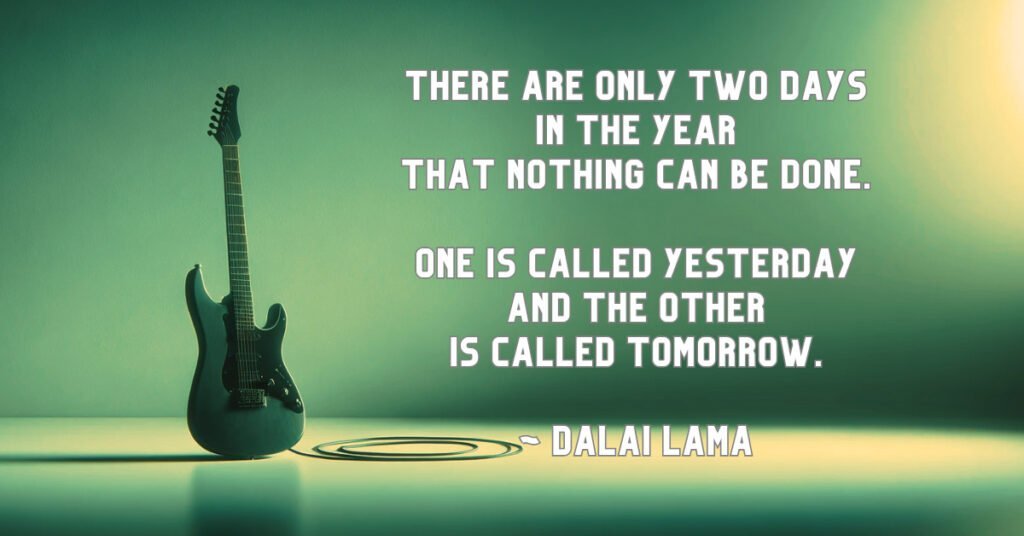
Introduction: Tuning Up for Life’s Performance
In life’s grand performance, much like a dynamic rock concert, our habits play crucial roles, sometimes harmonizing beautifully, other times clashing and causing dissonance. These ingrained behaviors, subtly woven into our daily lives, have the power to either amplify our potential or muffle the melodies within us. This article sets the stage to spotlight five such habitual patterns, highlighting how they can quietly, yet significantly, impact our overall life’s harmony. By tackling these habits head-on, we aim to fine-tune our existence to resonate with joy, fulfillment, and authenticity.
Embarking on this journey of self-improvement is like a band rehearsing for the big show. It requires patience, practice, and a keen ear for the subtle off-notes in our lives. Left unchecked, these habits can disrupt the beautiful symphony we strive to create, much like a guitar out of tune in an otherwise perfect ensemble. Addressing these habits calls for a deep dive into our psyche, necessitating introspection, honesty, and a readiness to adjust our life’s rhythm. In the following sections, we will dissect each habit, exploring their effects, untangling their complexities, and steering towards a life of greater harmony and satisfaction.
1. Trying to Please Everyone: The Endless Gig
Trying to please everyone is like a band attempting to play every genre in one concert. It’s a never-ending cycle of jumping from rock to jazz to country, trying to make each listener happy. This habit spreads us too thin, and as a result, our own performance starts to suffer. We become a jack of all trades, master of none, losing the essence of what makes our music – our life – unique and special. In this quest for universal applause, we often end up on a stage of perpetual dissatisfaction, constantly adjusting our setlist to suit the tastes of each new audience. The fear of letting someone down or facing their disappointment can become overwhelming, leading us to forget our own preferences, needs, and happiness.
The moment of transformation occurs when we decide to step down from this exhausting, never-ending gig and start playing the tunes that truly resonate with us. It’s about shifting the focus from external validation to internal satisfaction. When we begin to play our own music – the kind that stirs our soul and reflects our true self – something magical happens. We start to attract an audience that genuinely connects with and appreciates our authentic performance. This is not just about being appreciated for who we are but also about the liberation that comes with self-expression. We find that living authentically makes life more enjoyable and fulfilling. It’s no longer a performance for the sake of applause but a celebration of our individuality.
This shift to authenticity brings a newfound sense of freedom. We discover the joy of expressing ourselves without the fear of judgment or the need for approval. Our life becomes a concert where each song we play is a true reflection of ourselves, and in doing so, we form deeper, more meaningful connections. These connections are based not on a facade we present but on the genuine harmony of our true selves. As we embrace this authentic way of living, we realize that the most satisfying applause comes from within, from knowing that we are being true to ourselves and living a life that truly resonates with who we are.
2. Fearing Change: Stuck on Repeat
Fearing change is akin to a band playing the same old tunes repeatedly. It’s comfortable and familiar, like a classic hit that everyone loves, but over time, this comfort can morph into monotony. This habit of sticking to what’s known and avoiding the new confines us to our comfort zone, a place where growth is limited and the excitement of discovery is absent. Much like a well-worn record, staying in this zone can lead to weariness and a lack of enthusiasm. Change is the essence of life, and our personal evolution depends on our willingness to embrace new experiences and challenges. As the world around us continually transforms and progresses, clinging to the past can leave us feeling out of sync with the present.
Embracing change is a bold step, much like a musician venturing into a new genre. It can feel uncertain and risky, stepping away from the familiar chords and rhythms we’ve grown accustomed to. Yet, this step is essential for injecting vitality and freshness into our lives. Change invites us to explore new possibilities, to experiment with different styles, and to discover aspects of ourselves we may not have known existed. It’s about broadening our horizons, trying out new melodies, and adding depth to our repertoire. This process of exploration and adaptation is invigorating; it revitalizes our spirit and renews our enthusiasm for life.
When we open ourselves to change, we begin a journey of self-discovery and growth. It’s a journey that requires us to learn, adapt, and sometimes even unlearn old patterns. Each new experience is like a new song added to our playlist, enriching our collection and offering a broader perspective on life. As we learn to embrace change, we find that our life’s concert becomes more dynamic, diverse, and engaging. We become more versatile and adaptable musicians in the symphony of life, capable of playing a wider range of tunes and harmonizing with a variety of rhythms. Welcoming change not only keeps our life’s music diverse and captivating but also reflects our growth as individuals, constantly evolving and tuning into the ever-changing melodies of existence.
3. Living in the Past: The Nostalgia Loop
Living in the past is like being stuck in a loop, replaying cover songs from decades ago. This habit, while comforting in its familiarity, often prevents us from writing our own new, original scores. Dwelling on nostalgia can lead us into a life filled with regrets and ‘what ifs,’ trapping us in a time warp where we replay old hits and overlook the chance to make fresh, vibrant memories.
This perpetual loop of nostalgia can cloud our view of the present and future. We might find ourselves idealizing the past to the extent that our current life seems dull in comparison. This not only makes our present experiences less enjoyable but also diminishes our enthusiasm for what’s yet to come. Life’s true richness comes from its variety and evolution, and by clinging to the past, we miss out on embracing the changes and growth that come with time.
The real beauty, however, emerges when we break free from this cycle and start composing music for the present. Shifting our focus to the here and now opens up a world of possibilities, allowing us to create new memories and experiences that resonate with who we are today. It means actively engaging in life’s unfolding story, not just reminiscing about the chapters already written. Living in the present is like being the composer and the performer of our life’s symphony, where each moment offers a chance to create something unique and extraordinary.
By embracing the present, we give ourselves permission to live life to its fullest potential. It’s an opportunity to explore new rhythms, experiment with different styles, and express our current realities through our life’s melody. This approach enables us to appreciate the beauty of the present, recognize the value of each experience, and look forward to the future with optimism and excitement. In breaking out of the nostalgia loop, we open the door to a life that’s not only rich in new experiences but also more aligned with our ongoing personal growth and development.
4. Putting Yourself Down: The Inner Critic
Being overly critical of ourselves is like a musician who obsessively focuses on every wrong note played, overshadowing their musical talents and accomplishments. This relentless self-criticism can severely dampen our self-esteem and limit our abilities to perform effectively in various aspects of life. When we are constantly berating ourselves, we build an internal barrier that stifles our creativity, risk-taking, and willingness to embrace new challenges. This habit of self-doubt and negative self-talk can be paralyzing, preventing us from pursuing opportunities and experiences that could lead to personal growth and success.
This internal critic often acts like a harsh judge, scrutinizing every action and decision, and magnifying every mistake or flaw. It can create a cycle of self-doubt and fear of failure, making us hesitant to step out of our comfort zones. We might avoid trying new things or giving our best effort, fearing that we won’t meet the unrealistic standards we’ve set for ourselves. This can lead to missed opportunities, stagnation, and a sense of unfulfillment. The impact of this habit extends beyond our personal achievements; it can also affect our relationships, as we might project these insecurities onto others or withdraw from social interactions.
Transforming this inner critic into a supportive ally is crucial for our mental and emotional well-being. It involves shifting our focus from self-critique to self-compassion, recognizing that imperfections and mistakes are part of being human. Celebrating our achievements, no matter how small, helps build a positive self-image and nurtures our confidence. It’s about acknowledging our progress, valuing our efforts, and treating ourselves with the same kindness and encouragement we would offer to a friend. As we learn to be more forgiving and supportive of ourselves, we foster resilience and open ourselves up to new possibilities. This change in perspective not only enhances our performance in life but also makes our journey more enjoyable and fulfilling. By silencing the inner critic and amplifying the voice of encouragement and self-acceptance, we set the stage for a life filled with confidence, growth, and contentment.
5. Overthinking: Analysis Paralysis
Overthinking is like being a musician so caught up in tuning their instrument that they never get around to playing a note. This habit of over-analyzing every decision and possibility can lead to a state of paralysis, where we find ourselves unable to make any decision at all. We become lost in a maze of ‘what-ifs’ and ‘maybes,’ constantly second-guessing ourselves. This relentless pursuit of the perfect choice often means we miss out on good opportunities that come our way. The fear of making the wrong decision, or the pursuit of an unattainable perfection, can be crippling, leaving us stuck in our tracks and unable to move forward.
The repercussions of overthinking extend beyond indecision. It can significantly increase our stress levels and lead to a host of other issues, such as anxiety and even physical health problems. Constantly being in a state of analysis can drain our energy, diminish our ability to focus, and steal the joy from experiences that should be enjoyable. Moreover, it can have a ripple effect on our relationships and interactions with others, as our indecisiveness and lack of action can be frustrating for those around us.
To break free from the grip of overthinking, embracing spontaneity and action is key. It’s about learning to trust our gut feelings and making decisions with a sense of confidence, even if they’re not ‘perfect.’ By accepting that every decision won’t always lead to the best possible outcome, we give ourselves permission to move forward and learn from whatever the result may be. This mindset shift allows us to experience life more fully, engaging in the present moment rather than getting lost in our thoughts. Letting go of the need for perfection in every decision can liberate us, reducing stress and making our life journey more enjoyable. Embracing spontaneity leads to a more dynamic and fulfilling life, where we are free to experience and react to situations as they unfold, rather than being held back by the fear of what might or might not happen.
Conclusion: The Final Chorus
As we bring our journey through life’s limiting habits to a close, it’s clear that reshaping these habits is like adjusting the sound levels for an ideal performance. Each habit we modify adds a unique and harmonious note to our life’s melody, enriching its depth and vibrancy. When we reflect on these habits and actively work to transform them, our life turns into a series of encores, each more impressive and fulfilling than the last. This process of change is not merely about discarding negative patterns, but also about embracing new rhythms that enhance our growth and happiness. It’s a path of continuous self-improvement, where each step we take adds a melodious layer to our personal symphony. By acknowledging and striving to overcome these habits, we pave the way for a future that resonates with joy, fulfillment, and authenticity.
Looking ahead, our future shines brighter with every habit we conquer. Like a band that hones its skills over time, we too can master the art of living a harmonious life. Each habit we overcome is a victory in our journey of personal growth, a testament to our resilience and commitment to better ourselves. As we end this exploration, let’s move forward with the insights we’ve gained, ready to write new, inspiring chapters in our lives. The encore is our chance to display the best version of ourselves, to play life’s music with more passion, confidence, and harmony. Let’s seize this opportunity to turn our lives into a masterpiece, echoing with the beautiful melody of our true potential.


